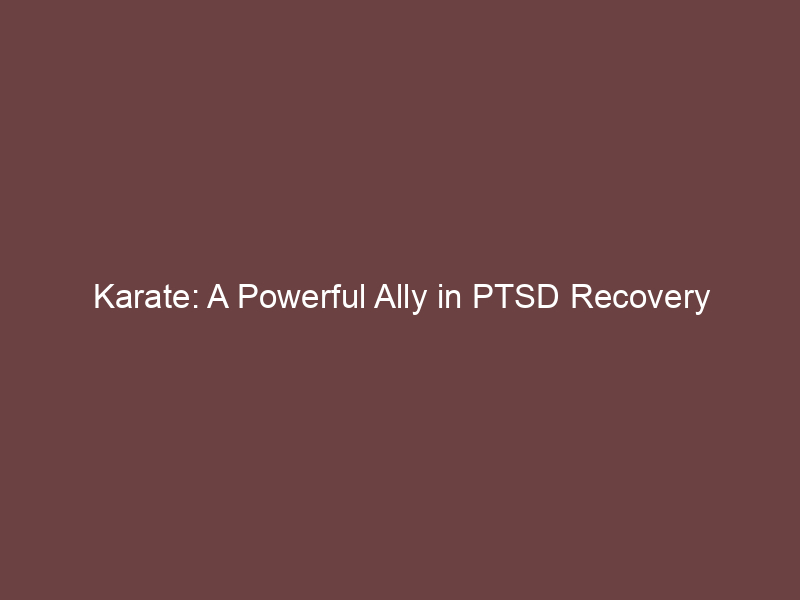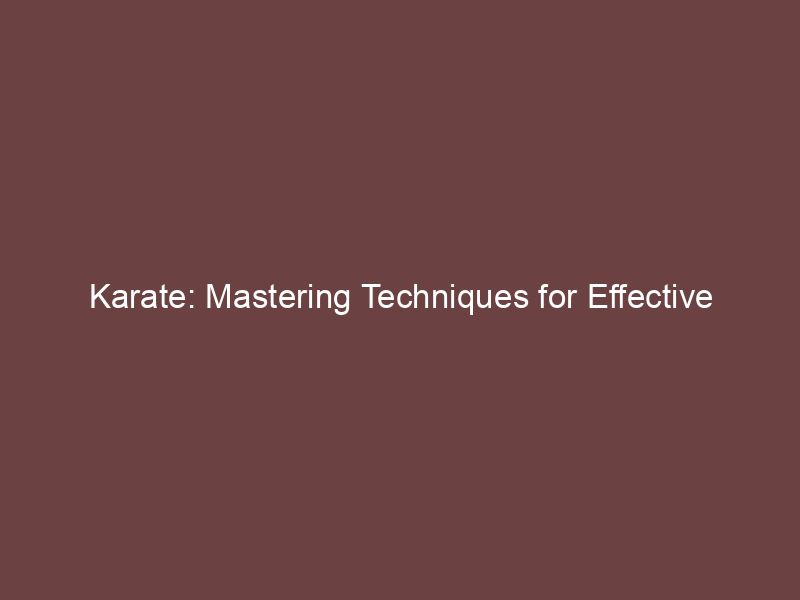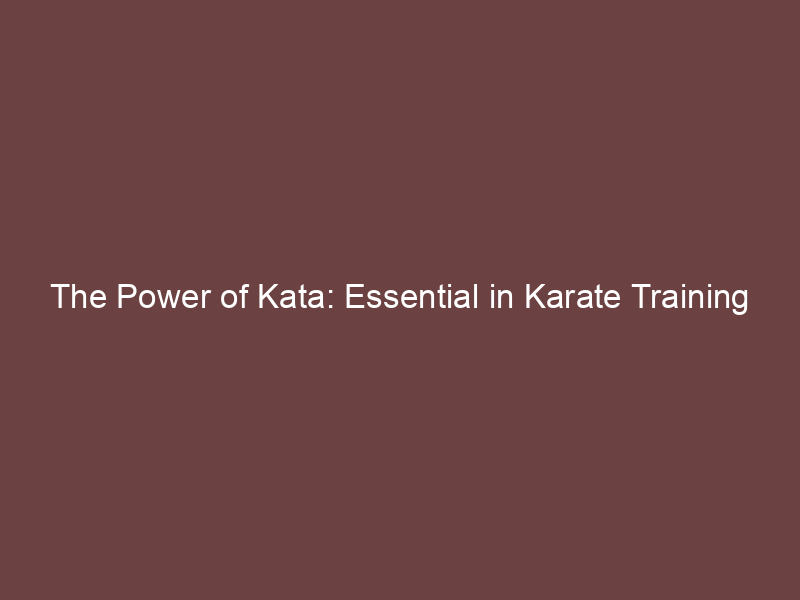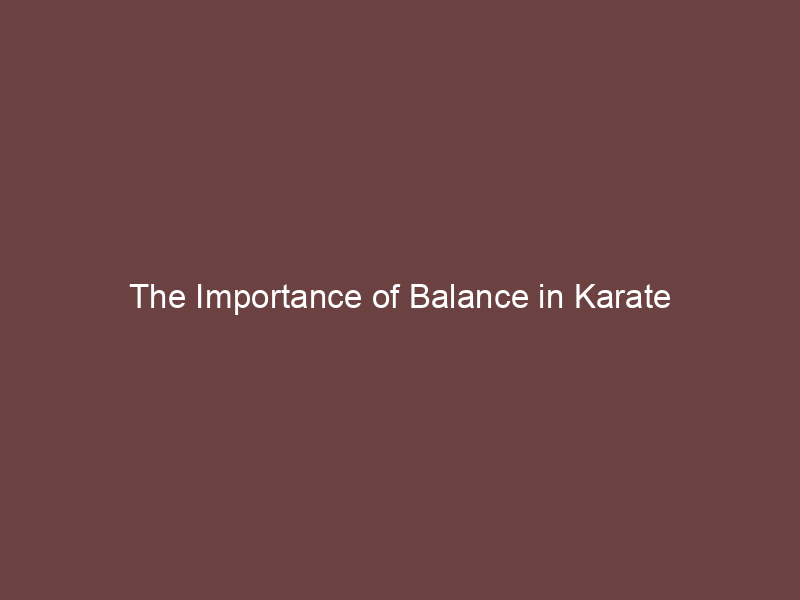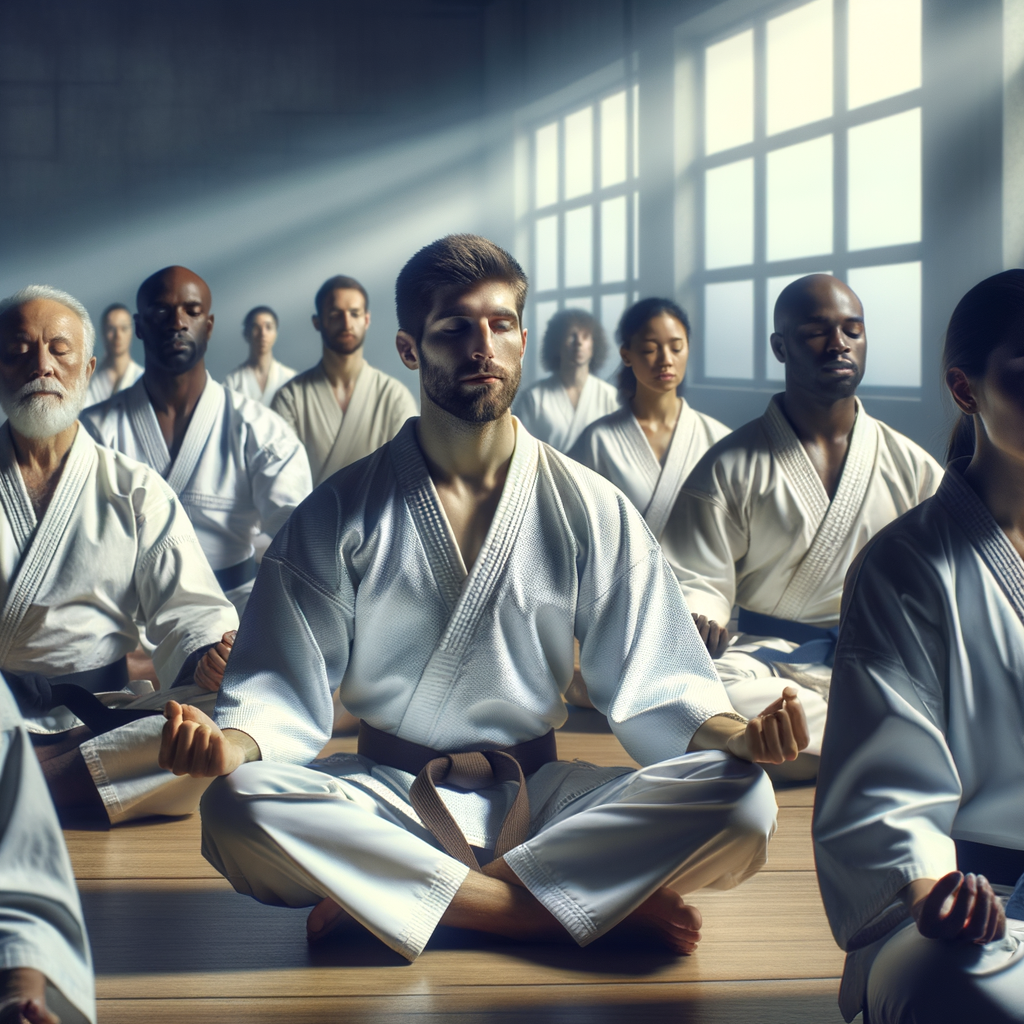
Introduction: Karate for PTSD
-
- Understanding PTSD
It is a mental health condition that happens after a person experiences a traumatic event. This can include things like natural disasters, accidents, or military combat. People with PTSD may have flashbacks, nightmares, and severe anxiety. They might also avoid places or things that remind them of the trauma.
-
- The Role of Physical Activities in PTSD Recovery
Exercise helps the body release endorphins, which are chemicals in the brain that make you feel good. Activities like running, swimming, or even walking can reduce stress and improve mood. Physical activities also help people sleep better, which is often a problem for those with PTSD.
-
- Why Choose Karate?
It teaches discipline, focus, and self-control. These skills can be very helpful for people with PTSD. Karate also provides a safe environment to release pent-up energy and emotions. Many people find that the structured routines and physical exertion of karate help them feel more grounded and in control.
The Benefits of Karate for PTSD Recovery
Mental Health Benefits of Karate
Karate is more than just a physical activity. It offers many mental health benefits, especially for those recovering from PTSD (Post-Traumatic Stress Disorder).
-
Improvement in focus and concentration:
It requires students to pay close attention to their movements and techniques. This practice helps improve focus and concentration. For someone with PTSD, this can be a great way to train the mind to stay present and engaged.
-
Boosting self-esteem and confidence:
Each new skill learned and each belt earned provides a sense of accomplishment. This can greatly enhance confidence, which is often diminished in those with PTSD.
-
Stress relief through physical exertion:
Karate involves rigorous physical exercise, which helps release endorphins, the body’s natural stress relievers. This can help reduce anxiety and improve overall mood.
Studies have shown that regular physical activity can significantly improve mental health. Exercise can reduce symptoms of depression and anxiety, making it a valuable tool for those with PTSD.
| Benefit | Description |
|---|---|
| Focus and Concentration | Karate helps train the mind to stay present and engaged. |
| Self-Esteem and Confidence | Mastering new skills and earning belts boosts confidence. |
| Stress Relief | Physical exertion releases endorphins, reducing stress. |
Physical Health Benefits of Karate
-
Improved cardiovascular health:
It involves a lot of movement, which gets your heart pumping. This can help improve your heart’s health. According to the American Heart Association, regular physical activity can reduce the risk of heart disease.
-
Increased strength and flexibility:
Karate training includes various exercises that build muscle strength and improve flexibility. For example, kicking and punching drills help strengthen your arms and legs. Stretching exercises in karate can also make your muscles more flexible.
-
Enhanced coordination and balance:
It requires you to perform precise movements. This helps improve your coordination and balance. Practicing karate can make you more aware of your body and how it moves, which can help prevent falls and injuries.
| Benefit | Description |
|---|---|
| Improved cardiovascular health | Regular karate practice helps keep your heart healthy by increasing your heart rate and improving blood circulation. |
| Increased strength and flexibility | Karate exercises build muscle strength and improve flexibility through various drills and stretches. |
| Enhanced coordination and balance | Karate training improves your ability to coordinate movements and maintain balance, reducing the risk of falls. |
PTSD Recovery Through Martial Arts: A Closer Look at Karate
Karate Therapy for PTSD
- How karate therapy worksThe movements in karate require concentration, which can help distract from traumatic memories. This focus on the present moment is similar to mindfulness practices.
-
Key components of karate therapy
- Physical Exercise: Regular practice helps release stress and improve overall health.
- Mental Discipline: Learning and mastering techniques requires mental effort, which can build confidence.
- Breathing Techniques: Controlled breathing helps manage anxiety and stress.
- Community Support: Training with others provides a sense of belonging and support.
-
Case studies of successful PTSD treatment with karate
Case Study Outcome John, a war veteran Improved sleep and reduced anxiety after 6 months of karate therapy. Lisa, a trauma survivor Increased confidence and better emotional control after 1 year of practice. These examples show that karate can be a powerful tool in managing PTSD symptoms.
Martial Arts for Trauma Recovery
-
Emotional healing through karate:
It helps people heal emotionally. When practicing karate, individuals learn to focus their mind and body. This focus can help them manage their emotions better. For example, deep breathing techniques in karate can calm the mind. This is especially helpful for those who have experienced trauma.
-
How karate helps in trauma recovery:
The repetitive movements and routines can be soothing. They give a sense of control and predictability. This can be very comforting for someone recovering from trauma. Additionally, karate encourages discipline and self-respect. These values can help rebuild self-esteem and confidence.
Karate for Mental Wellness: Beyond PTSD
Healing PTSD with Karate
- Personal stories of healing PTSD with karateJohn, a war veteran, shared how karate helped him regain control over his life. He said, “Karate gave me a sense of purpose and a way to channel my emotions.”
Another story is of Sarah, who faced trauma after a car accident. She found that practicing karate helped her feel stronger and more confident. “Karate taught me to focus on the present moment and not dwell on the past,” she explained.
- Role of karate in emotional healingIt helps in emotional healing. The discipline and focus required in karate can help calm the mind. This is especially important for those dealing with PTSD.
Studies have shown that physical activities like karate can reduce stress and improve mood. By practicing karate, individuals can release pent-up emotions and find a healthy way to cope with their feelings.
Karate for Stress Relief
-
- How karate helps in stress management
It helps in managing stress. When you practice karate, you focus on your movements and breathing. This focus helps to clear your mind of worries and stress.
Karate involves deep breathing exercises. These exercises help to calm your mind and body. When you breathe deeply, your body gets more oxygen. This can make you feel more relaxed and less stressed.
Karate teaches discipline and self-control. These skills can help you manage stress better in your daily life. When you know how to control your body and mind, you can handle stressful situations more calmly.
-
- Scientific studies supporting karate for stress relief
One study published in the Journal of Sports Sciences found that participants who practiced karate had lower levels of stress hormones.
Another study from the International Journal of Environmental Research and Public Health showed that karate training improved mental health and reduced stress in participants. The study concluded that regular karate practice could be an effective way to manage stress.
These studies highlight the benefits of karate for stress relief. By practicing karate, you can improve your mental health and feel less stressed.
Conclusion: Karate as a Powerful Ally in PTSD Recovery
-
Revisiting the benefits of karate for PTSD recovery:
- Physical Fitness: Karate helps improve strength, flexibility, and overall fitness.
- Mental Focus: Practicing karate requires concentration, which can help clear the mind and reduce stress.
- Emotional Balance: Karate teaches self-control and discipline, which can help manage emotions better.
- Social Interaction: Joining a karate class can provide a sense of community and support.
-
How to get started with karate:
- Find a Local Dojo: Look for a karate school or dojo in your area. Many offer beginner classes.
- Start with Basic Moves: Begin with simple techniques and gradually progress to more complex ones.
- Attend Regular Classes: Consistency is key. Attend classes regularly to see improvement.
- Seek Support: Talk to instructors and fellow students. They can offer guidance and encouragement.
| Benefit | Description |
|---|---|
| Physical Fitness | Improves strength, flexibility, and overall fitness. |
| Mental Focus | Requires concentration, helping to clear the mind and reduce stress. |
| Emotional Balance | Teaches self-control and discipline, aiding in better emotion management. |
| Social Interaction | Provides a sense of community and support through class participation. |
It offers physical, mental, and emotional benefits. Starting karate is simple and can be a rewarding journey. Whether you are looking to improve your fitness or find a supportive community, karate has something to offer.

